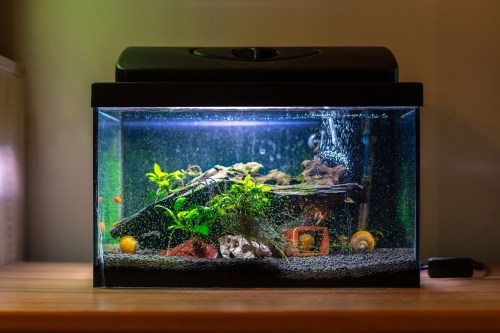
No matter how talented an aquarist or fish parent you are, you’ll probably run into cloudy aquarium water at some point. Maybe your filter breaks unexpectedly or one of your fish has tummy problems, and you wind up with a tank so murky you can’t see through it.
If you walk in to feed your fish and stumble on cloudy aquarium water, don’t panic. While a good tank cleaning will probably be necessary, it’s even more important to discover the underlying problem. We’re here to show you how to clear cloudy aquarium water and keep your fish safe from filth.
What does the color of my aquarium water tell me?
The first step: Figure out what’s wrong with your water, which means determining what color it is. This will give you more information than you think, as the shade will often hint at the deeper cause. You don’t need to hold up a paint-matching card or anything, but see if you can identify the hue. Would you describe it as more white, green, or brown? Each of these discolorations stems from something different and indicates a separate issue. Then tackle the problem by getting to the source.
Why is my fish tank water cloudy white?
Surprisingly enough, white aquarium water often means to leave it alone. Yup, this tint sometimes tells you that your tank needs to stabilize. In fact, too many water changes can actually spark cloudy water, which is frequently the result of a bacteria bloom. The good news is that as the tank cycles through, the bacteria and other dissolved nutrients will find a balance and the cloudiness will clear.
However, white water sometimes comes from other issues. To find out, test your tank and see if the chemicals and nutrients are out of whack. In that case, a conditioner can straighten out the problem. The one exception: If you recently put in new gravel and the water gets cloudy instantly, you didn’t rinse the stones enough. You’ll probably have to pull everything out and give it a good cleaning before returning it — and, of course, change the water again.
Where did all the green come from in my fish aquarium?
This one’s usually pretty easy to figure out. Most of the time, when your aquarium water is green, you’ll see an abundance of algae. Unfortunately, the tricky part isn’t getting it off but keeping it from coming back. When your algae is blooming, it means something else in your fish’s home is not quite right.
First, try adjusting the lighting. Like all plants, algae lives on sunlight, and your tank lamp or natural sunlight exposure could be encouraging the green water. You also need to run your full testing kit right away, since algae growth could indicate that your nitrate or other levels have gotten off. If your tests consistently come back out of range, make sure your tank is clean enough and that you’ve removed any dead plants or animals.
What does yellow water mean for the fish in my tank?
Yellow water gives the easiest diagnosis: Your tank is dirty. If your water looks yellowish or brownish, your filter is probably not up to snuff. First, do a thorough clean of the tank, including removing items like gravel and accessories for a scrubbing. Then, take apart the filter and examine it carefully. Some models have replaceable pieces that easily swap in and out.
Otherwise, you may need to invest in a new one — and don’t forget that adding fish might mean you need a more powerful system. Keep in mind, too, that no amount of filtration will make up for an overcrowded tank. Think about an upgrade to make more space, especially if your fish have grown or recently had babies who now have precious little room to swim.
Why is my aquarium cloudy and won’t clear?
No matter the color (or the underlying conditions), you will almost always want to do three things to clear up your water:
- Run a water test
- Check your filtration system
- Do a partial water change or maintenance clean
If you’ve gone through these steps and nothing seems to work, you’ll have to dig into your tank issues a little deeper. First, take a look at your own behaviors, especially how much food you provide during meals. You shouldn’t see any extra flakes floating around long after your fish have finished their meal. Next, pay even more attention to your swimmers and their habits, including the bathroom ones. Last, reach out to an expert, either by calling up your local store or posting pics to a forum.
Diagnosing your aquarium issue isn’t rocket science. With a few glances at the dirty aquarium and a couple of testing kits, you’ll get it back to beautiful clear water in no time. Bear in mind, many tank problems are invisible and don’t affect water color or clarity, so check your pH and nutrient levels frequently, even if everything looks good to the naked eye. Aquarium health means fish health, and keeping their home tidy will go a long way toward keeping them happy.
Editors' Recommendations
- What fish can live with bettas? These are your best bets for fish buddies
- What causes high pH in an aquarium? We’ll walk you through getting your tank levels in check
- Add rainbowfish to your tank – these beauties will brighten up any aquarium
- Is your fish tank for bettas too small? Here’s are the do’s and don’ts of betta care
- Try adding a few of these saltwater aquarium plants to breathe life into your tank